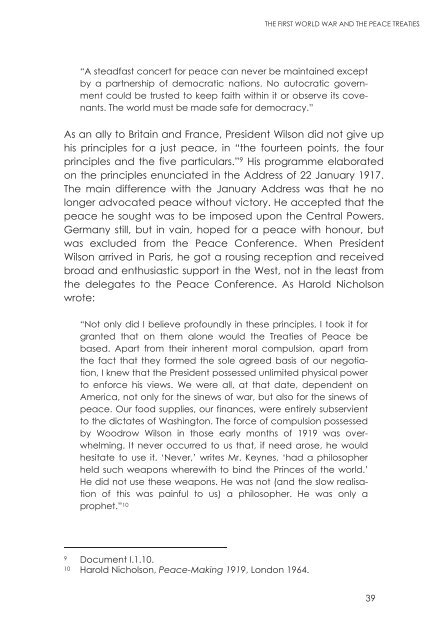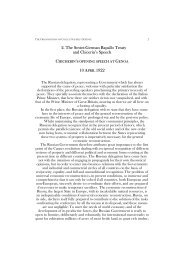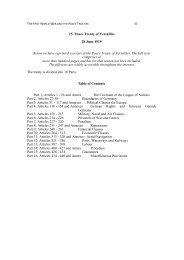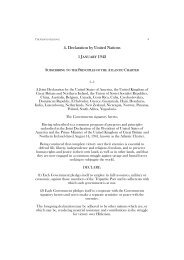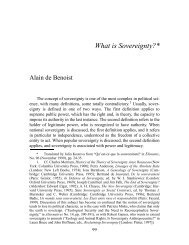CHAPTER 1 THE FIRST WORLD WAR AND THE PEACE TREATIES
CHAPTER 1 THE FIRST WORLD WAR AND THE PEACE TREATIES
CHAPTER 1 THE FIRST WORLD WAR AND THE PEACE TREATIES
You also want an ePaper? Increase the reach of your titles
YUMPU automatically turns print PDFs into web optimized ePapers that Google loves.
<strong>THE</strong> <strong>FIRST</strong> <strong>WORLD</strong> <strong>WAR</strong> <strong>AND</strong> <strong>THE</strong> <strong>PEACE</strong> <strong>TREATIES</strong><br />
“A steadfast concert for peace can never be maintained except<br />
by a partnership of democratic nations. No autocratic government<br />
could be trusted to keep faith within it or observe its covenants.<br />
The world must be made safe for democracy.”<br />
As an ally to Britain and France, President Wilson did not give up<br />
his principles for a just peace, in “the fourteen points, the four<br />
principles and the five particulars.” 9 His programme elaborated<br />
on the principles enunciated in the Address of 22 January 1917.<br />
The main difference with the January Address was that he no<br />
longer advocated peace without victory. He accepted that the<br />
peace he sought was to be imposed upon the Central Powers.<br />
Germany still, but in vain, hoped for a peace with honour, but<br />
was excluded from the Peace Conference. When President<br />
Wilson arrived in Paris, he got a rousing reception and received<br />
broad and enthusiastic support in the West, not in the least from<br />
the delegates to the Peace Conference. As Harold Nicholson<br />
wrote:<br />
“Not only did I believe profoundly in these principles, I took it for<br />
granted that on them alone would the Treaties of Peace be<br />
based. Apart from their inherent moral compulsion, apart from<br />
the fact that they formed the sole agreed basis of our negotiation,<br />
I knew that the President possessed unlimited physical power<br />
to enforce his views. We were all, at that date, dependent on<br />
America, not only for the sinews of war, but also for the sinews of<br />
peace. Our food supplies, our finances, were entirely subservient<br />
to the dictates of Washington. The force of compulsion possessed<br />
by Woodrow Wilson in those early months of 1919 was overwhelming.<br />
It never occurred to us that, if need arose, he would<br />
hesitate to use it. ‘Never,’ writes Mr. Keynes, ‘had a philosopher<br />
held such weapons wherewith to bind the Princes of the world.’<br />
He did not use these weapons. He was not (and the slow realisation<br />
of this was painful to us) a philosopher. He was only a<br />
prophet.” 10<br />
9 Document I.1.10.<br />
10 Harold Nicholson, Peace-Making 1919, London 1964.<br />
39


